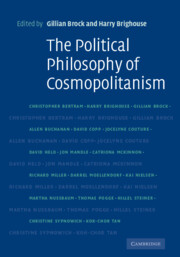Book contents
- Frontmatter
- Contents
- List of contributors
- Preface
- 1 Introduction
- 2 Principles of cosmopolitan order
- 3 Territorial justice and global redistribution
- 4 International justice and the basic needs principle
- 5 Cosmopolitans, cosmopolitanism, and human flourishing
- 6 Global justice, moral development, and democracy
- 7 A cosmopolitan perspective on the global economic order
- 8 In the national interest
- 9 Cosmopolitan respect and patriotic concern
- 10 Persons' interests, states' duties, and global governance
- 11 The demands of justice and national allegiances
- 12 Cosmopolitanism and the compatriot priority principle
- 13 Beyond the social contract: capabilities and global justice
- 14 Tolerating injustice
- 15 Cosmopolitan hope
- Bibliography
- Index
6 - Global justice, moral development, and democracy
Published online by Cambridge University Press: 04 December 2009
- Frontmatter
- Contents
- List of contributors
- Preface
- 1 Introduction
- 2 Principles of cosmopolitan order
- 3 Territorial justice and global redistribution
- 4 International justice and the basic needs principle
- 5 Cosmopolitans, cosmopolitanism, and human flourishing
- 6 Global justice, moral development, and democracy
- 7 A cosmopolitan perspective on the global economic order
- 8 In the national interest
- 9 Cosmopolitan respect and patriotic concern
- 10 Persons' interests, states' duties, and global governance
- 11 The demands of justice and national allegiances
- 12 Cosmopolitanism and the compatriot priority principle
- 13 Beyond the social contract: capabilities and global justice
- 14 Tolerating injustice
- 15 Cosmopolitan hope
- Bibliography
- Index
Summary
Of all the unlucky things that can happen to a person, being born into the wrong state has to be one of the worst. Someone who is born to become the citizen of a wealthy country enjoys life prospects far better than those unfortunate enough to be born in a poor one. According to a common view, the goal of distributive justice is to nullify the effects of brute luck on a person's life and to make their success or failure a function not of their circumstances but of their choices. Such a conception, once projected onto a global scale, becomes awesomely demanding in its apparent redistributive implications. Moreover, since there will always be new people born into circumstances not of their choosing, but, rather, determined by the prior choices of their forbears, such a view suggests an almost permanent regime of correction and transfer.
This essay argues that in order to secure individuals' access to an important set of goods and some morally significant capacities, we ought to favor political arrangements that severely limit the scope for such luck-compensatory transfers. The goods in question are those associated with being a functioning citizen of a democratic community and the capacities are the Rawlsian ones of being able to form, pursue, and revise one's conception of the good and of a sense of justice.
- Type
- Chapter
- Information
- The Political Philosophy of Cosmopolitanism , pp. 75 - 91Publisher: Cambridge University PressPrint publication year: 2005
- 6
- Cited by

